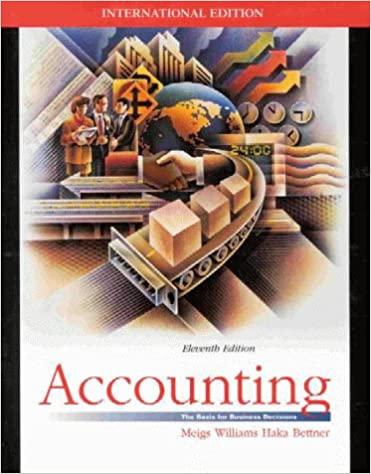Question
FIFO Method, Physical Flow, Equivalent Units, Unit Costs, Cost Assignment Swasey Fabrication, Inc., manufactures frames for bicycles. Each frame passes through three processes: Cutting, Welding,
FIFO Method, Physical Flow, Equivalent Units, Unit Costs, Cost Assignment
Swasey Fabrication, Inc., manufactures frames for bicycles. Each frame passes through three processes: Cutting, Welding, and Painting. In September, the Cutting Department of the Tulsa, Oklahoma, plant reported the following data:
- In Cutting, all direct materials are added at the beginning of the process.
- Beginning work in process consisted of 41,000 units, 20 percent complete with respect to direct labor and overhead. Costs in beginning inventory included direct materials, $1,215,000; direct labor, $222,000; and applied overhead, $150,000.
- Costs added to production during the month were direct materials, $2,575,000; direct labor, $3,471,250. Overhead was assigned using the following information:
Activity Rate Actual Driver Usage Inspection $150 per inspection hour 4,000 inspection hours Maintenance $750 per maintenance hour 1,600 maintenance hours Receiving $300 per receiving order 2,000 receiving orders - At the end of the month, 121,000 units were transferred out to Welding, leaving 14,000 units in ending work in process, or 25 percent complete.
Assume that the FIFO method is used.
Required:
1. Prepare a physical flow schedule.
| Units to account for: | |
| Units, beginning work in processUnits completed and transferred outUnits, ending work in processUnits, beginning work in process | Units, beginning work in process |
| Units completed and transferred outUnits, ending work in processUnits started (transferred in)Units started (transferred in) | Units started (transferred in) |
| Total units to account for | fill in the blank 7d6b260a3077f92_5 |
| Units accounted for: | |
| Units, beginning work in processUnits completed and transferred outUnits started (transferred in)Units completed and transferred out | Units completed and transferred out |
| Units, beginning work in processUnits, ending work in processUnits started (transferred in)Units, ending work in process | Units, ending work in process |
| Total units accounted for | fill in the blank 7d6b260a3077f92_10 |
Feedback
1. A physical flow schedule shows the units to account for and what happened to them.
2. Calculate equivalent units of production for direct materials and conversion costs.
| Equivalent Units | |
| Direct Materials | fill in the blank e44263036f91f8d_1 |
| Conversion Costs | fill in the blank e44263036f91f8d_2 |
3. Compute unit cost. Round unit costs & final answer to three decimal places. $fill in the blank e44263036f91f8d_3 per unit
4. Calculate the cost of goods transferred to Welding at the end of the month. In your calculations, round unit costs to three decimal places. Round your final answer to the nearest dollar. $fill in the blank e44263036f91f8d_4
Calculate the cost of ending inventory. In your calculations, round unit costs to three decimal places. Round your final answer to the nearest dollar. $fill in the blank e44263036f91f8d_5
Feedback
2. The equivalent units schedule measures the output of the period. A fully completed unit is counted as a unit of output. Output for a unit in ending work in process is counted by its degree of completion.
3. Using FIFO, cost per equivalent unit is calculated using only current costs. Determine by dividing current costs for direct materials and conversion costs by the associated equivalent units. Add all unit costs to get the total cost per equivalent unit.
4. The cost of goods (services) transferred out is the unit cost multiplied by the units completed. The cost of EWIP is the unit cost multiplied by the equivalent units found in EWIP. The partially completed units and all their associated costs are transferred to the next process (department) by debiting the WIP account of the process (department) receiving the unit and crediting the WIP account of the transferring process (department).
Step by Step Solution
There are 3 Steps involved in it
Step: 1

Get Instant Access to Expert-Tailored Solutions
See step-by-step solutions with expert insights and AI powered tools for academic success
Step: 2

Step: 3

Ace Your Homework with AI
Get the answers you need in no time with our AI-driven, step-by-step assistance
Get Started


